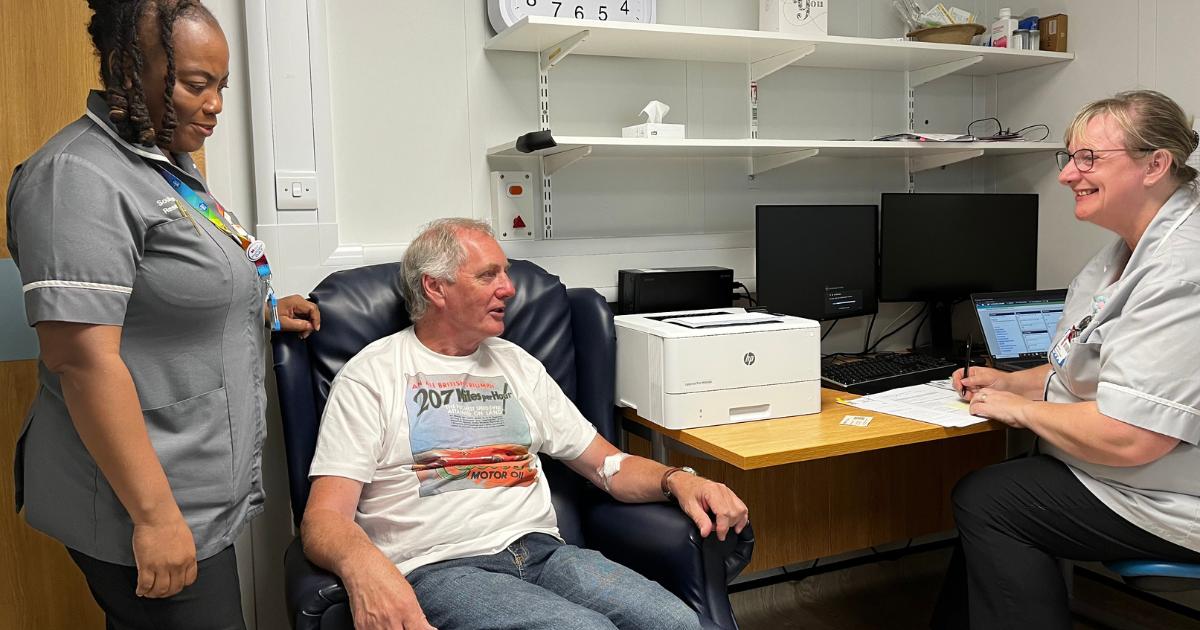The MODERNISED study, currently running in Dorset, has recruited more than 450 participants as it evaluates a new blood test designed to detect multiple cancers at their earliest stages.
Unlike other tests in development, the technology being trialled identifies immune system responses to cancer rather than relying on DNA markers.
The test is also being assessed for its ability to pinpoint the type of cancer detected.
The study is taking place at five hospitals across the UK, including University Hospitals Dorset and Dorset County Hospital.
It is led by researchers in Southampton in collaboration with the Southampton Clinical Trials Unit and Proteotype Diagnostics Ltd.
The trial is funded by the National Institute for Health and Care Research (NIHR) Invention for Innovation programme and the Office for Life Sciences.
READ: Breakthrough blood test trial for dementia diagnosis begins in Dorset
Ian Robinson taking part in MODERNISED at UHS.
Ian Robinson, 72, who was diagnosed with colorectal cancer following routine screening, is among those taking part in the study.
Mr Robinson said: “I was sent the NHS bowel cancer screening kit.
“I think I had done four of these, normally with a negative result, but the most recent one indicated that there was a chance of cancer which was confirmed with a colonoscopy.
“There were no symptoms, no pain, nothing, so you would never know until it was much more advanced and therefore much more difficult to treat.”
He said he was pleased to take part in the trial.
Mr Robinson said: “Obviously the team here is helping me, so I’m delighted to participate and hopefully help improve the way things are done.
“My mother died from cancer. I now have children and five grandchildren, so yes, research is absolutely vital.
“The more cancers that can be identified as early as possible, that can benefit future generations, then it’s obviously the right way to go.”
READ: Dorset charity helps woman to fund potentially life-extending cancer drug
Victoria Goss, associate professor and head of Early Diagnosis Research at the Southampton Clinical Trials Unit. (Image: UHS) Each year, around 385,000 people in the UK are diagnosed with cancer.
Dr Victoria Goss, associate professor and head of early diagnosis research at the Southampton Clinical Trials Unit, said: “When cancers are diagnosed later, there are often fewer treatment options available to patients.
“Detecting cancer early means that treatment can begin sooner, increasing the chances of successful outcomes for patients.
“Improving early diagnosis is therefore a priority for us as researchers and for the NHS.
“But currently there are only four screening programmes in the UK and screening is only for one cancer at a time, so we are aiming to develop simple tests that can potentially pick up the signs of multiple cancers, giving the best possible chance of early, successful treatment.”
READ: Walkers raise over £900k for Macmillan Cancer Support
Prof Andy Davies. (Image: UHS) The study is led by Professor Andy Davies, director of the Southampton Cancer Research UK and NIHR Experimental Cancer Medicine Centre.
Professor Davies said: “Most current research into multi-cancer blood tests is focussed on detecting abnormal DNA that has been released into the blood stream by cancer cells.
“But this circulating tumour DNA cannot always be detected in the very early stages of cancer.
“We are instead looking at levels of certain proteins found in blood.
“We know that even in the earliest stages of cancer, the body’s immune response can lead to higher levels of these proteins being released, and we believe these may be a good way to test for early signs of the disease.”
